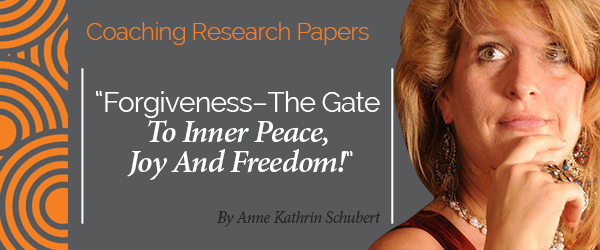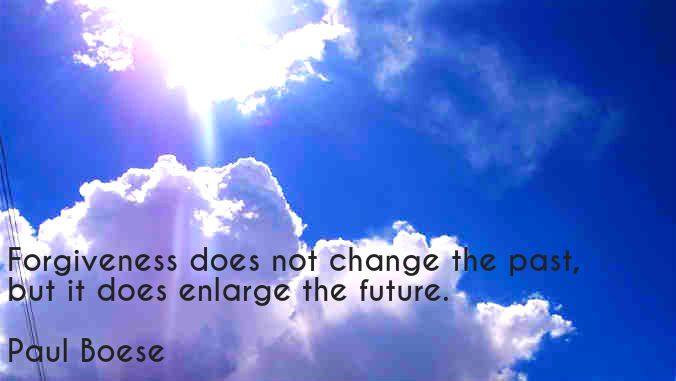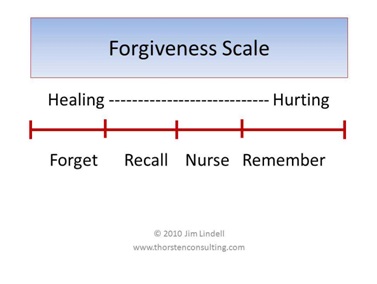
Research Paper By Anne Kathrin Schubert
(Life Coach, GERMANY)
 Introduction
Introduction
Forgiveness is a topic that concerns everyone. We all get disappointed, offended and hurt by people and have to decide whether to hold resentment or to forgive.
In a coaching session a client might have inner judgments or beliefs he or she might even not be aware of, which are slowing her down or even block her completely to move on and embrace her destiny. One example would be a client who wants to lose weight, but still carries bitterness about her Mom, who told her that she looks ugly; in order to be freed from this belief
I am ugly
and to move towards her goal she might have to forgive her Mom.
In this article I want to explore the subject of forgiveness, how it affects us and the coaching process and how we can manage this difficult but so powerful task. I will touch both areas: Forgiving others and forgiving ourselves.
What is forgiveness?
People have different understandings of forgiveness. There are some misunderstandings I have heard while talking with people. Let´s see what forgiveness is not and what it really means.
Forgiveness is not
Forgiveness is
How does forgiveness influence the effectiveness of coaching?
Benefits of forgiveness
I want to give an example: In January 1990, Sue Norton received the terrible news that her mother and father had been found murdered in their Oklahoma home. The killer walked away with an old truck and 17000$. While she sat through the murder trial of Robert B.K. Knighton, she could feel the hatred in the air ad her parent’s family and friends crowded in the courtroom. Norton new, that hatred wasn´t going to heal her of the terrible loss she had sustained. She decided to visit the killer in his holding cell.
She recalls that when she saw him, she didn´t think of him as a killer. She thought of him as a human being. She said to the big man with steely eyes: I don´t know what to say to you, but I want you to know that I don´t hate you…. If you are guilty, I forgive you
Today Robert is a changed man and is still in touch with Sue. Some friends think she has lost her mind. But she says,
In three separate studies, including one with Catholics and Protestants from Northern Ireland whose family members were murdered in the political violence, he found that people who are taught how to forgive become less angry, feel less hurt, are more optimistic, become more forgiving in a variety of situations, and become more compassionate and self-confident. His studies show a reduction in experience of stress, physical manifestations of stress, and an increase in vitality.
How can a coach help in the process of forgiveness?
Building rapport
Building rapport is the foundation for openness and trust in a coaching relationship. When rapport is established both people feel peace, safety, free with each other and room for honesty. The coach creates it by expressing openness and empathy, in showing respect and being completely nonjudgmental towards the client. The body language is most important, but also the use of the voice. By marching with the client, the coach will adjust to her body language and voice, and even the words of the client.
Creating Awareness
The coach can ask some powerful questions and listen actively in order to create awareness in the client. He can do this by
- Repeating back what the client said
- Asking powerful questions which will emerge by listening intensively. They can also be like
Tool: responsibility versus blame
The coach can assist the client on his journey to let blame and resentment go and take responsibility, which will set free to take action. Bitterness is like a prison for the one who carries it. It keeps her in bondage of limited negative thoughts and feelings, even pain. The coach can explain this to the client to create more awareness. There are direction our blame normally is focused on.
Blaming other people
When we are blaming someone or something else, we are actually giving our power away and putting ourselves in the position of being a victim. …When we choose to blame, we choose burden. If, however, we decide that every situation is something that we created, then we are back in control. We can make choices, which will change or at least modify the situation. When we choose to take responsibility, we choose freedom.
Blaming herself
As the client forgives herself, she decides to let go othe past and its pain and embrace the present and the future. Nobody is perfect and we all do mistakes. It is our choice if we dwell in them or if we decide to learn from them as we move on. To help in the process the coach might ask the client to speak to herself from the perspective of a friend. What would she tell herself who is still feeling guilty about that certain issue?
Interventions
Some coaching styles offer interventions, for example NLP. However, some interventions can be done by any coach.
2nd position
This exercise can be done in a conflict situation, not in a traumatic experience. It can be offered to the client if she feels it will be good for her. The goal is to create awareness about the other persons feelings and thoughts or why she acted the way she did.
The client puts a paper on the ground with the name of the person she blames for something. Then she steps on it and imagines being in her shoes, coping her body language and voice. Then she answers questions the coach asks about how she feels and thinks in this situation, why she acted that way and so on. After that the client steps down and shares how the experience was and what new insights she got.
Visualization
The client can visualize the person she has not yet forgiven, for example how she is stepping towards her, shaking her hand, giving her a hug or any other body expression. Then she can speak out forgiveness so she can hear herself and say: I forgive you…(name)…for…(specific for what).
Prayer
As a Christian I have experienced many times the power of prayer and God´s loving and comforting presence, which wants to heal and restore us. As Jesus Christ helped me to forgive, He made the bitterness and pain just to melt away Many people have shared similar experiences with me. Forgiveness can be painful, and God who created us is the perfect healer of our hearts.
Process
Forgiving often is a process. It is a decision in the mind, and often the words have to be repeated until they have reached the heart. This can be helpful to be explained to the client.
Many times you can identify what stage a person is in based on the way he/she describes the memory.
The secret to moving along the continuum is the individual’s own freedom of choice. Victim thought patterns will keep a person at the remembering or hurting side of the continuum. Acceptance thought patterns will move a person toward the forgetting and the healing side of the continuum. We cannot change the past, but we can change the future.
Forgiveness is not about forgetting. It is about letting go of another person’s throat……Forgiveness does not create a relationship. Unless people speak the truth about what they have done and change their mind and behavior, a relationship of trust is not possible. When you forgive someone you certainly release them from judgment, but without true change, no real relationship can be established………Forgiveness in no way requires that you trust the one you forgive. But should they finally confess and repent, you will discover a miracle in your own heart that allows you to reach out and begin to build between you a bridge of reconciliation………Forgiveness does not excuse anything………You may have to declare your forgiveness a hundred times the first day and the second day, but the third day will be less and each day after, until one day you will realize that you have forgiven completely. And then one day you will pray for his wholeness……
Conclusion
Forgiveness in coaching touches the area of counseling. However, as a life coach it is one very essential part in people’s lives which cannot be ignored. If the client wants to let go of painful things in the past in order to move forward, the coach can assist her on this journey. However, if other emotional issues seem to be overwhelming and the client unable to get them under control, e.g traumatic issues, the coach should not hesitate to release her to a professional counselor.
I want to close with 3 quotes.
The weak can never forgive. Forgiveness is the attribute of the strong. (Mahatma Gandhi)
True forgiveness is when you can say,
Thank you for that experience. (Oprah Winfrey)
Then Peter came to Jesus and asked,
Lord, how many times shall I forgive my brother or sister who sins against me? Up to seven times?
Jesus answered,
I tell you, not seven times, but seventy-seven times.
![]()
Additional Ressources
"American Psychological Association. Forgiveness: A Sampling of Research Results.". 2006. Retrieved 2009-02-07.
Psychology today, Psych Basics: Forgiveness
Joyce Meyer, Living beyond your feelings. P. 211
Fred Luskin, Ph.D. Forgive for Good: A Proven Prescription for Health and Happiness (Harper, 2002)
http://thorstenconsulting.com: Forgiveness and Forgetting - The Ability to Move Forward
Wm. Paul Young, The Shack: Where Tragedy Confronts Eternity
Mahatma Gandhi, All Men are Brothers: Autobiographical Reflections
The Bible, Matthew 18:21-22
